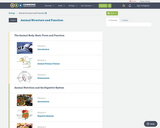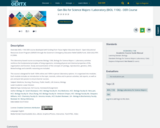
Lab Manual for General Biology I
- Subject:
- Biology
- Life Science
- Material Type:
- Activity/Lab
- Date Added:
- 01/30/2024

Lab Manual for General Biology I
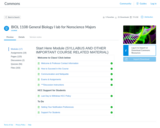
This is a OER lab manual for BIOL 1108 developed by HCC faculty. This manual is in alignments with the curriculum requirements for Biology Non Science Majors lab.

This textbook is a collection of technology guides to help students understand the technical aspects of bioinformatics.
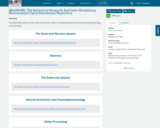
The BRAINOER modules contain OER resources for students studying behavioral neuroscience, psychophysiology, and physiology.
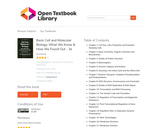
A grasp of the logic and practice of science is essential to understand the rest of the world around us. To that end, the CMB3e iText (like earlier editions) remains focused on experimental support for what we know about cell and molecular biology, and on showing students the relationship of cell structure and function. Rather than trying to be a comprehensive reference book, CMB3e selectively details investigative questions, methods and experiments that lead to our understanding of cell biology. This focus is nowhere more obvious than in the chapter learning objectives and in external links to supplementary material. The Basic CMB3e version of the iText includes links to external web-sources as well as the author’s short, just-in-time YouTube VOPs (with edited, optional closed captions), all embedded in or near relevant text. Each video is identified with a descriptive title and video play and QR bar codes.
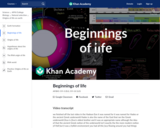
Life and photosynthesis start to thrive in the Archean Eon.
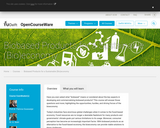
Have you ever asked what “biobased” means or wondered about the key aspects in developing and commercializing biobased products? This course will answer those questions and more; highlighting the opportunities, hurdles, and driving forces of the bioeconomy.
Today’s industries face enormous global challenges when it comes to the fossil-based economy. Fossil resources are no longer a desirable feedstock for many products and governments’ climate goals put various limitations to its usage. Moreover, consumer perception has become an increasingly important factor. With biobased products as an alternative to the fossil-based economy, the bioeconomy can provide viable solutions to these challenges.
The course describes the different types of biomass, the methods of refinery and typical conversion technologies used for biobased products. You’ll also engage in a study of the practical and real-life examples emerging in the market: biopolymers, bioenergy, bioflavours, and biosurfactants.
The course has been developed by a team of experts from seven different institutions and universities in three different countries, all sharing their personal perspectives on the opportunities and challenges faced by the biobased industry. The three top-ranked institutions Delft University of Technology, RWTH Aachen University, and Wageningen University & Research offer additional, more advanced courses to continue your learning journey:
Industrial Biotechnology: a more advanced course that digs deeper into engineering aspects of bio-based products.
MicroMasters Chemistry and Technology for Sustainability: Help drive the transition from fossil sources to renewable energy ones and engineer a biobased future.
Sustainable Development: The Water-Energy-Food Nexus: Introduction to sustainable development and its relation to the Water-Energy-Food Nexus.
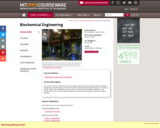
This course focuses on the interaction of chemical engineering, biochemistry, and microbiology. Mathematical representations of microbial systems are featured among lecture topics. Kinetics of growth, death, and metabolism are also covered. Continuous fermentation, agitation, mass transfer, and scale-up in fermentation systems, and enzyme technology round out the subject material.
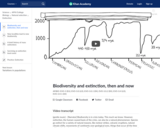
Overview of biodiversity and extinction.

Our goal is to present the key observations and unifying concepts upon which modern biology is based; it is not a survey of all biology! Once understood, these foundational observations and concepts should enable you to approach any biological process, from disease to kindness, from a scientific perspective. To understand biological systems we need to consider them from two complementary perspectives; how they came to be (the historic, that is, evolutionary) and how their structures, traits, and behaviors are produced (the mechanistic, that is, the physicochemical)
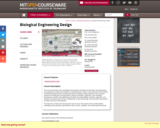
This course illustrates how knowledge and principles of biology, biochemistry, and engineering are integrated to create new products for societal benefit. It uses a case study format to examine recently developed products of pharmaceutical and biotechnology industries: how a product evolves from initial idea, through patents, testing, evaluation, production, and marketing. Emphasizes scientific and engineering principles; the responsibility scientists, engineers, and business executives have for the consequences of their technology; and instruction and practice in written and oral communication. The topic focus of this class will vary from year to year. This version looks at inflammation underlying many diseases, specifically its role in cancer, diabetes, and cardiovascular disease.
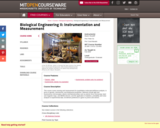
This course covers sensing and measurement for quantitative molecular/cell/tissue analysis, in terms of genetic, biochemical, and biophysical properties. Methods include light and fluorescence microscopies; electro-mechanical probes such as atomic force microscopy, laser and magnetic traps, and MEMS devices; and the application of statistics, probability and noise analysis to experimental data.
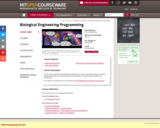
In this course problems from biological engineering are used to develop structured computer programming skills and explore the theory and practice of complex systems design and construction.

Biology is designed for multi-semester biology courses for science majors. It is grounded on an evolutionary basis and includes exciting features that highlight careers in the biological sciences and everyday applications of the concepts at hand. To meet the needs of today’s instructors and students, some content has been strategically condensed while maintaining the overall scope and coverage of traditional texts for this course. Instructors can customize the book, adapting it to the approach that works best in their classroom. Biology also includes an innovative art program that incorporates critical thinking and clicker questions to help students understand—and apply—key concepts.

Biology is the science that studies life, but what exactly is life? This may sound like a silly question with an obvious response, but it is not always easy to define life. For example, a branch of biology called virology studies viruses, which exhibit some of the characteristics of living entities but lack others. It turns out that although viruses can attack living organisms, cause diseases, and even reproduce, they do not meet the criteria that biologists use to define life. Consequently, virologists are not biologists, strictly speaking. Similarly, some biologists study the early molecular evolution that gave rise to life; since the events that preceded life are not biological events, these scientists are also excluded from biology in the strict sense of the term. From its earliest beginnings, biology has restled with these questions: What are the shared properties that make something “alive”? And once we know something is alive, how do we find meaningful levels of organization in its structure?
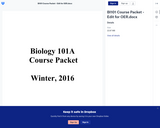
Lab Manual for BIO101 at Mt Hood Community College. The associated textbook is available at https://openoregon.pressbooks.pub/mhccbiology101/
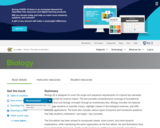
Biology 2e is designed to cover the scope and sequence requirements of a typical two-semester biology course for science majors. The text provides comprehensive coverage of foundational research and core biology concepts through an evolutionary lens. Biology includes rich features that engage students in scientific inquiry, highlight careers in the biological sciences, and offer everyday applications. The book also includes various types of practice and homework questions that help students understand—and apply—key concepts. The 2nd edition has been revised to incorporate clearer, more current, and more dynamic explanations, while maintaining the same organization as the first edition. Art and illustrations have been substantially improved, and the textbook features additional assessments and related resources. The first edition of Biology by OpenStax is available in web view here.
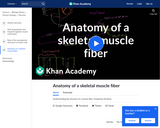
This 17-minute video lesson looks at understanding the structure of a muscle cell. [Biology playlist: Lesson 50 of 71].
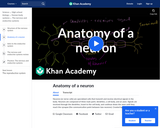
This 6-minute video lesson provides an introduction to the neuron and its anatomy. [Biology playlist: Lesson 41 of 71].
